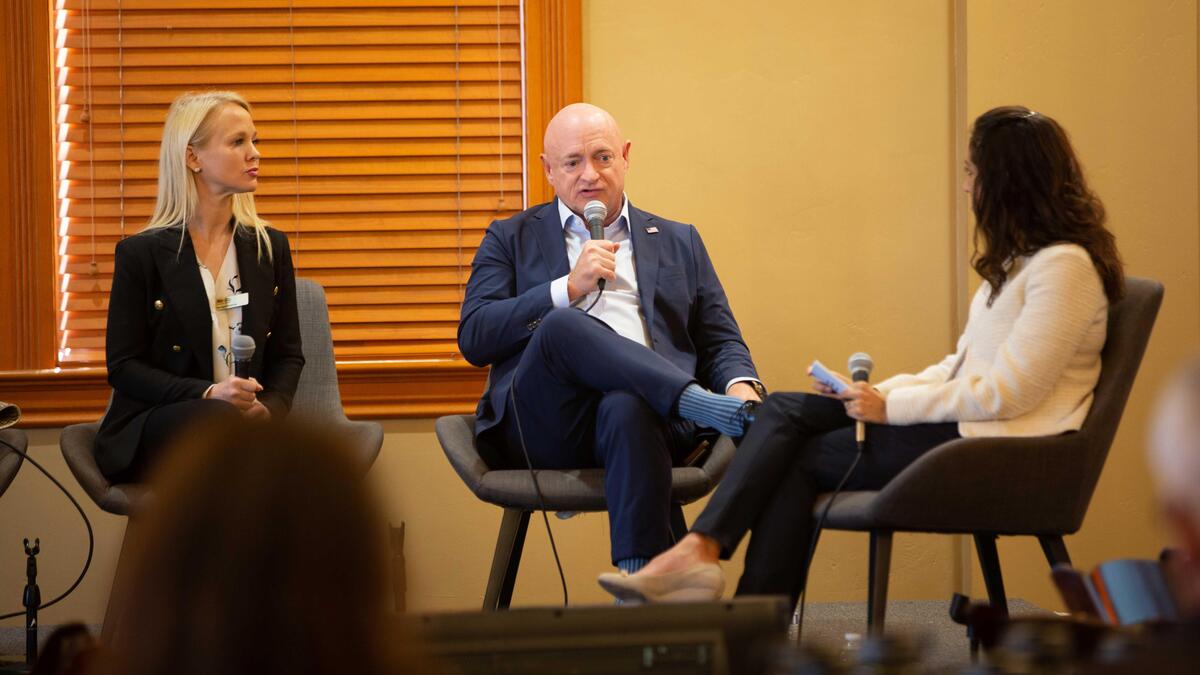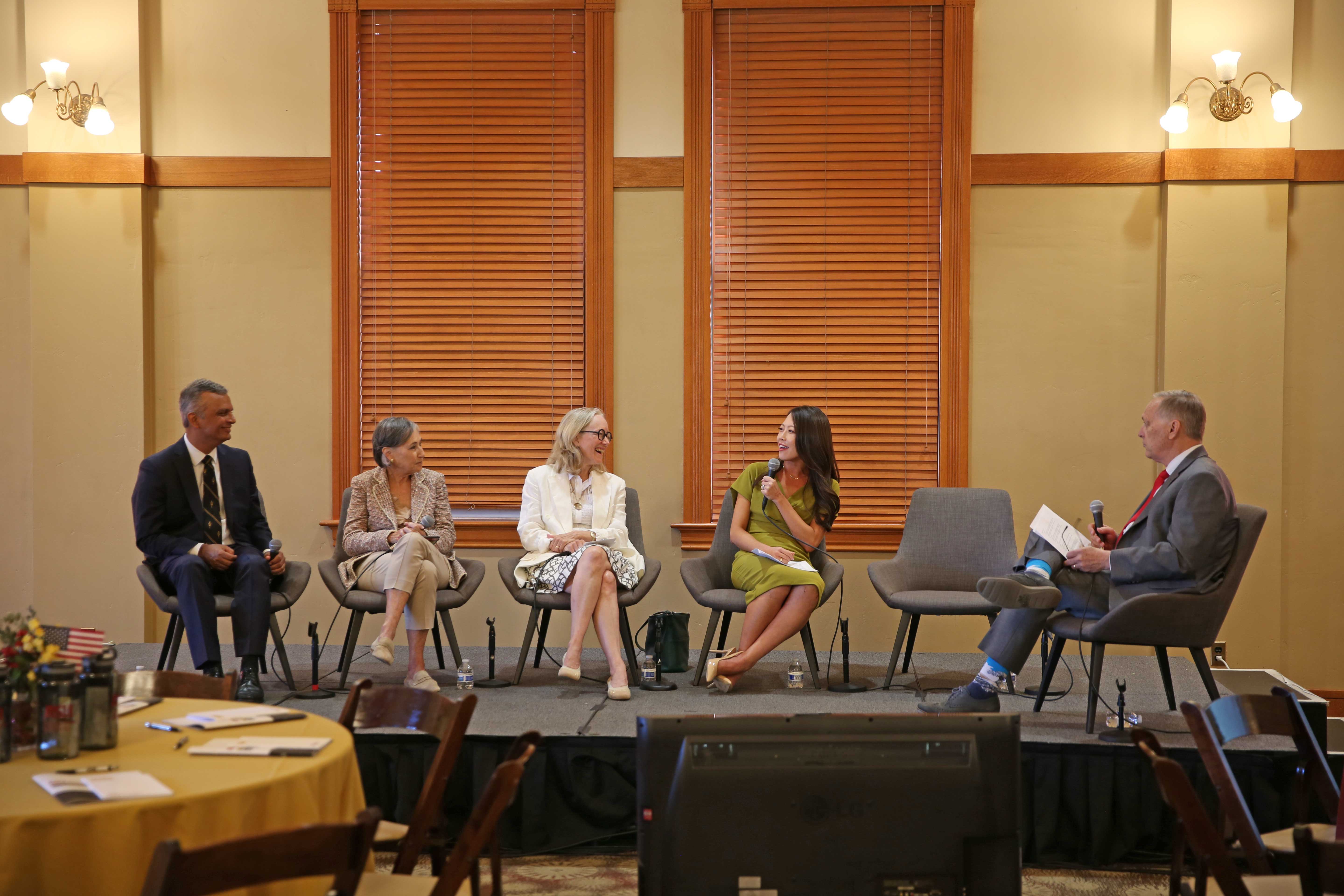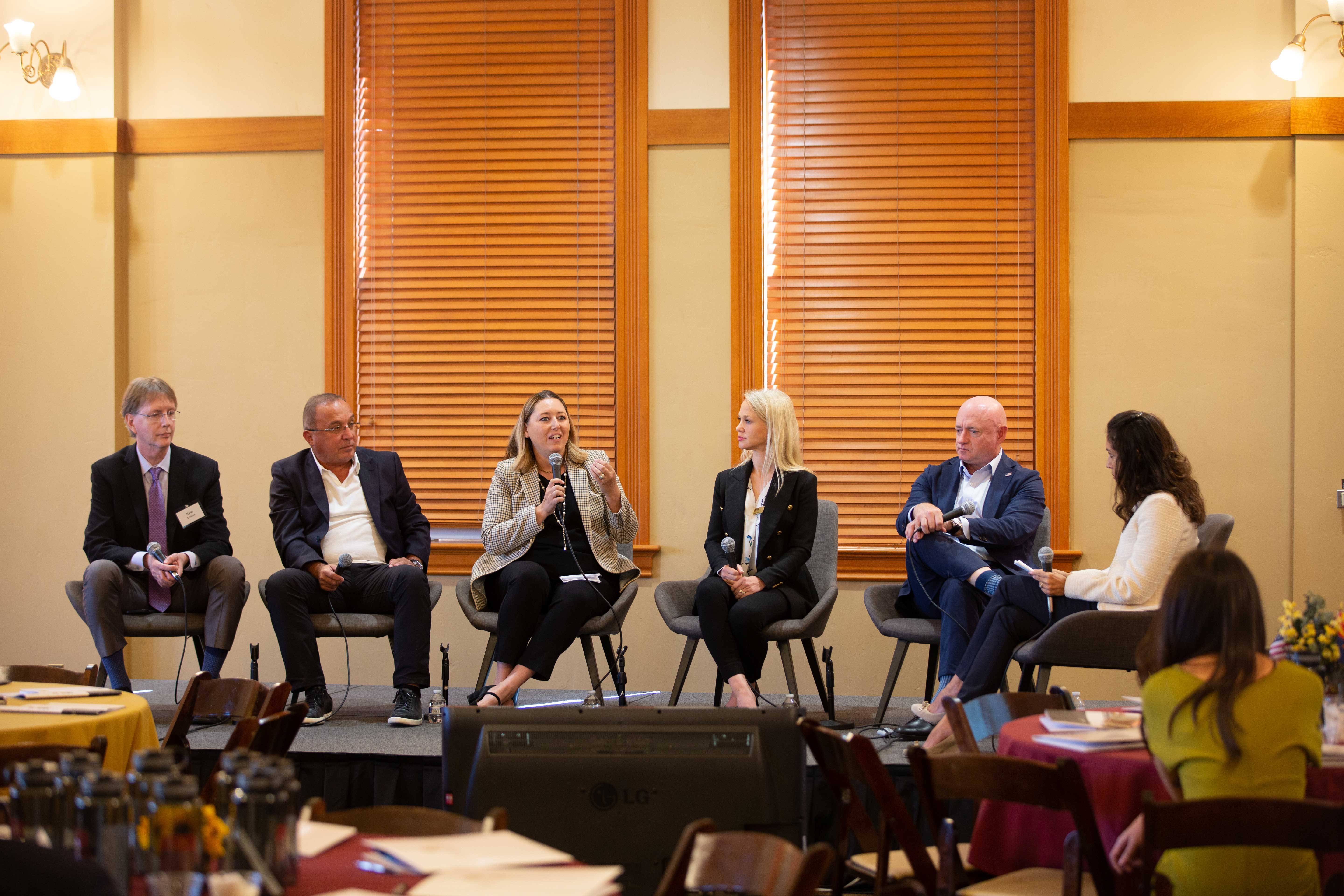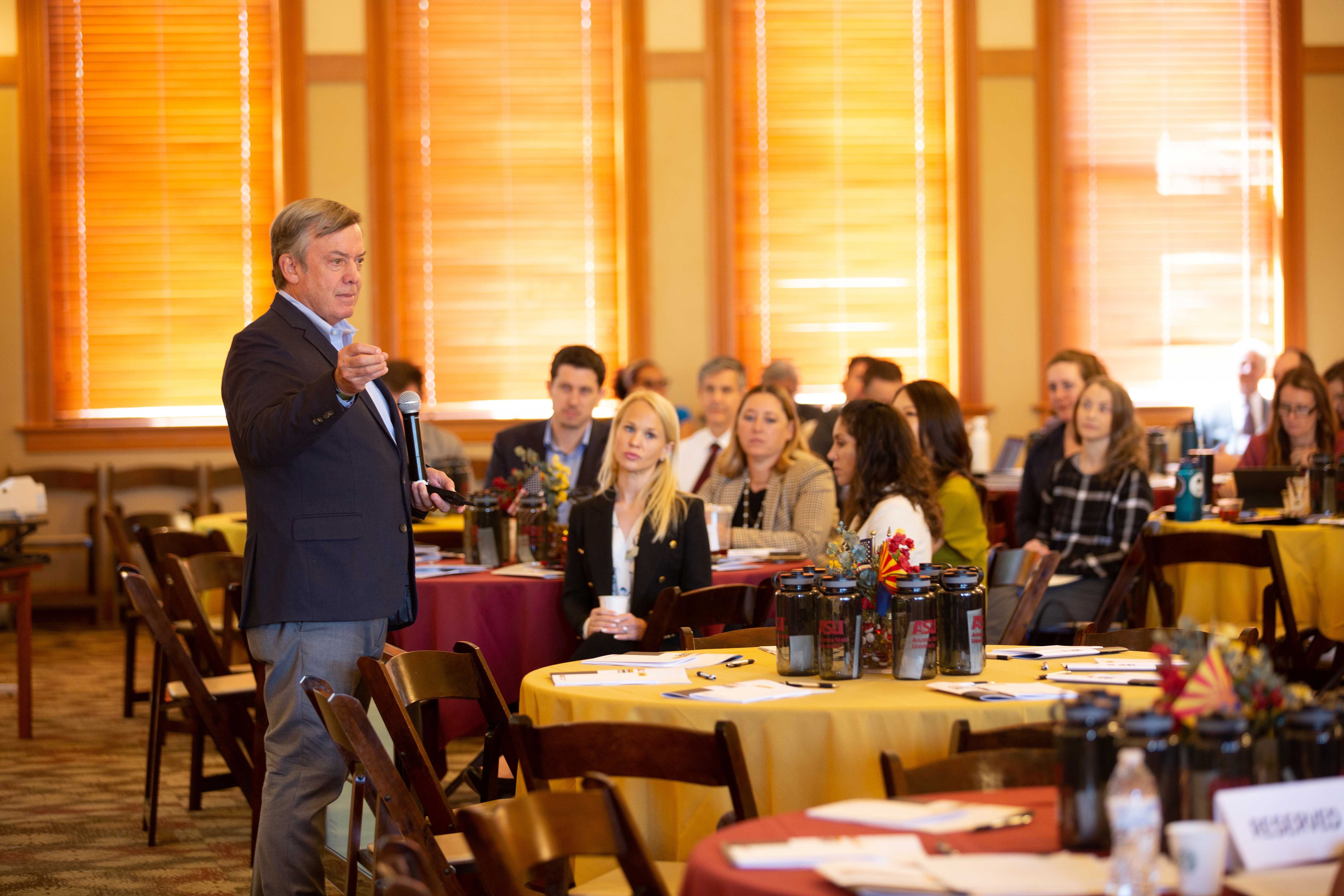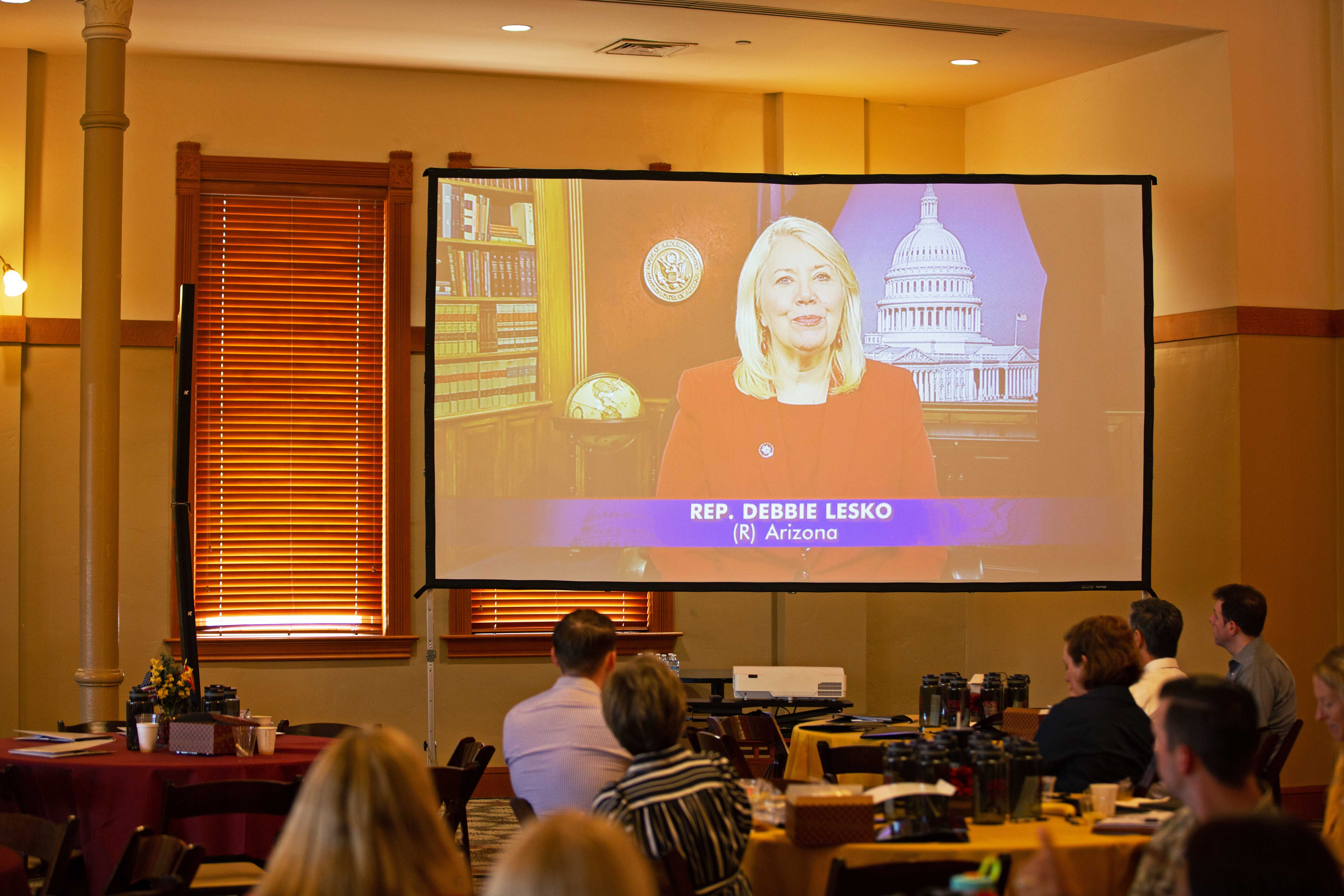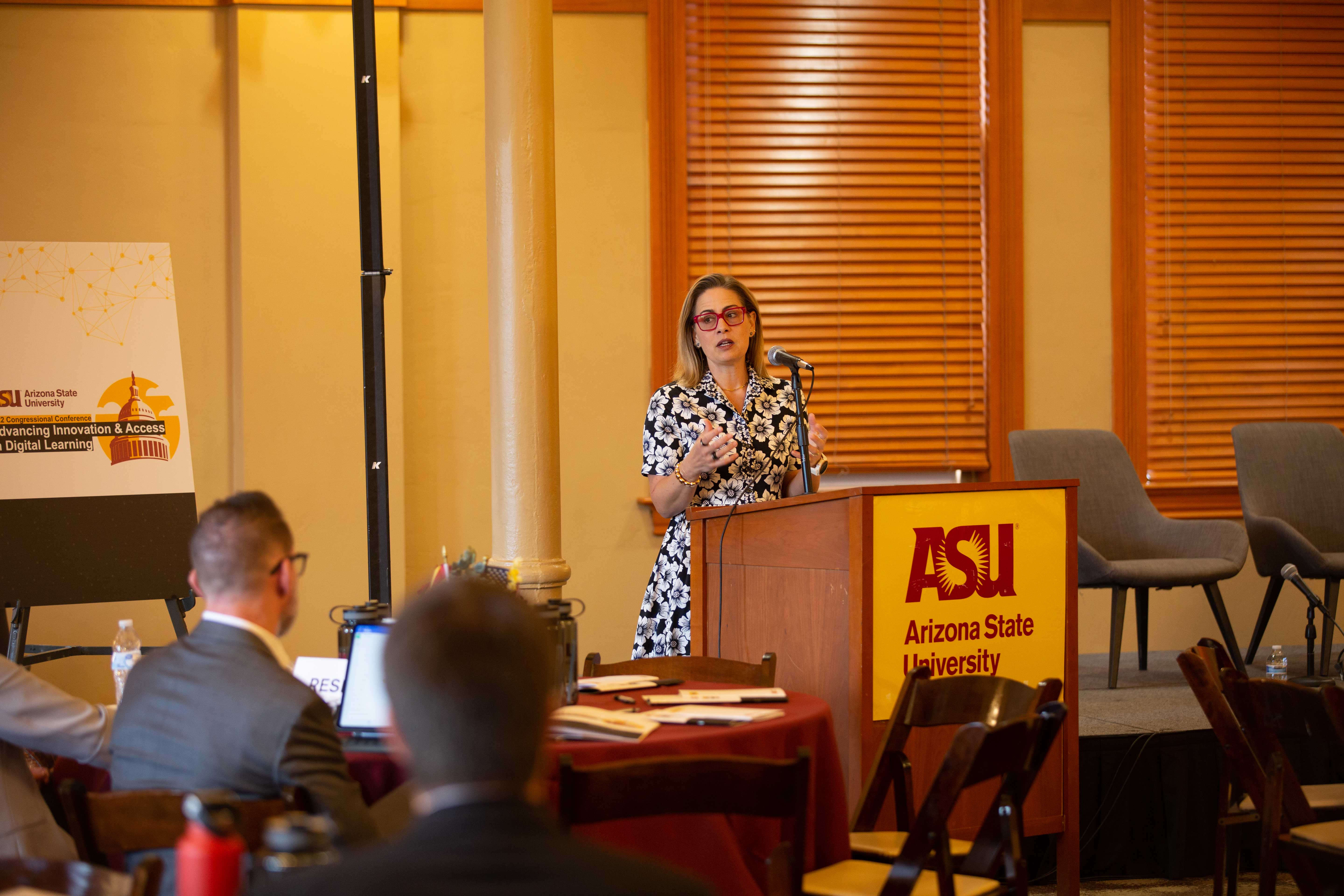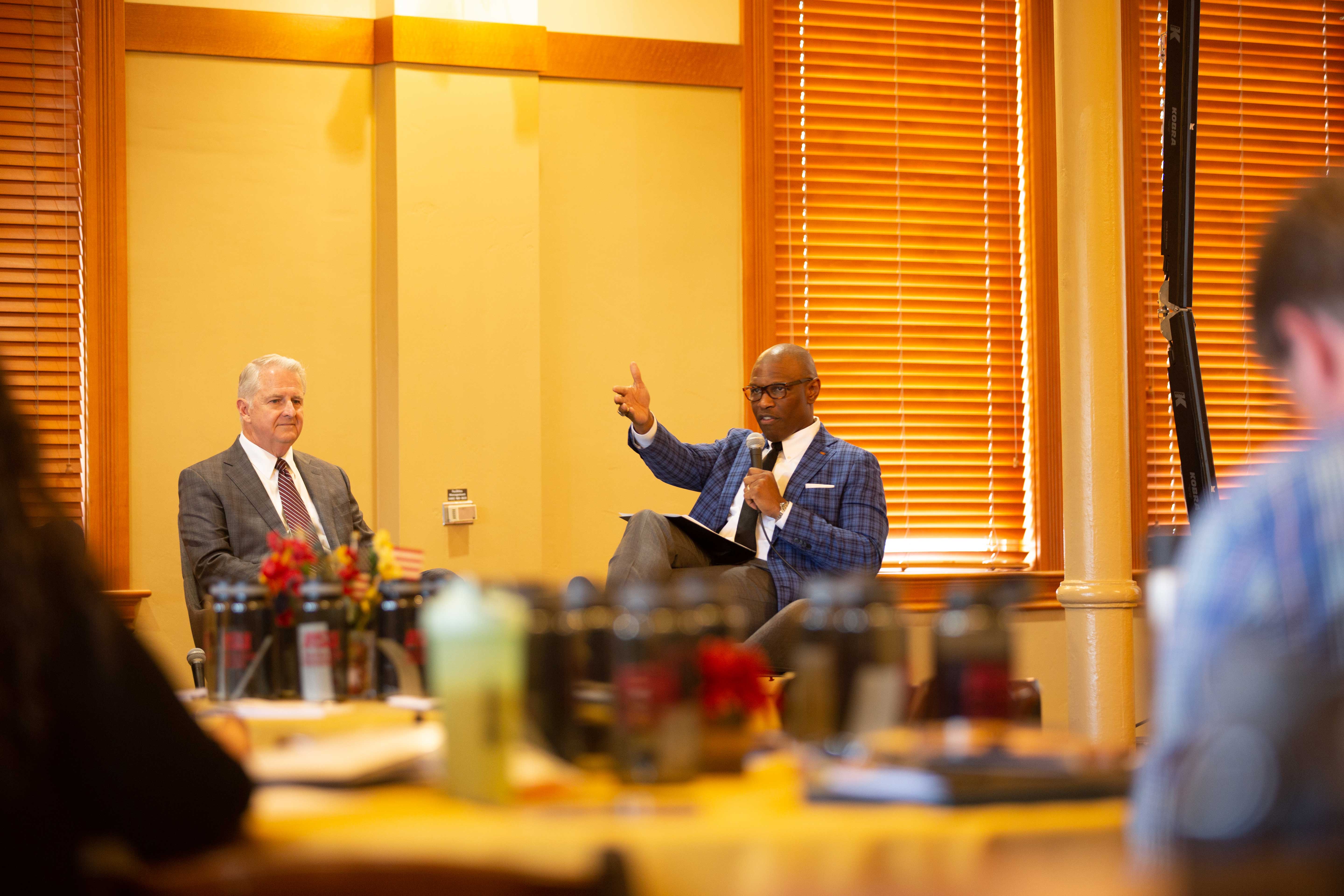Digital learning and economic advancement are inextricably linked. That’s why Arizona State University is using advanced technology with pedagogical tools to chart new pathways for learners of all ages, transforming and expanding the university's reach.
These tools are needed to help Arizona and the nation lead – not follow – the rapid transformation of digital learning, workforce development and military readiness.
That was the theme of discussion at the sixth annual Congressional Conference on Aug. 16 at Old Main on the Tempe campus, titled “Advancing Innovation and Access in Digital Learning.” The daylong event showcases the many ways in which the digital world has already changed the way we live and learn, and determined who can participate in a rapidly shifting economy.
The event featured panels and attendees that included members of the Arizona Senate, Congress, academic leaders and industry experts.
“Our affiliations with government and private industry are key to our ability to bring greater opportunity to the people of our state,” said Sally C. Morton, executive vice president of ASU’s Knowledge Enterprise. Knowledge Enterprise supports research across ASU, a university with an annual research expenditure of $673 million. “That is why we are so excited to have so many of Arizona’s leaders of government and commerce with us today.”
Sally C. Morton, vice president of ASU’s Knowledge Enterprise, addresses attendees of the 2022 Congressional Conference on Aug. 16 at Old Main on the Tempe campus.
'Digital Enablement and the Future of Higher Education'
ASU and universities throughout the nation should think about students in a much wider scope than in the past, said panelists who spoke at the panel titled "Digital Enablement and the Future of Higher Education."
The 18- to 22-year-old students are usually the ones front-and-present on college campuses, but there are millions of others — nontraditional, lifelong, military — in the workforce who now populate higher education. Digital technology is starting to allow universities the capability to teach them, but now it needs to be done at scale.
Moderated by U.S. Rep. Andy Biggs, the panel included Ara Austin, director of online engagement and strategic initiatives in The College of Liberal Arts and Sciences at ASU; Kathleen deLaski, founder and CEO of Education Design Lab; Ann Kirschner, president of Comma Communications; and Raghu Santanam, senior associate dean of ASU's W. P. Carey School of Business.
“Consumer needs and demands are changing the needs of education,” deLaski said. “We need to offer a degree in a stepladder approach and lead the way in an innovative approach.”
From left: Panelists Raghu Santanam, senior associate dean of the W. P. Carey School of Business; Ann Kirschner, president of Comma Communications; Kathleen deLaski, founder and CEO of Education Design Lab; Ara Austin, director of Online Engagement and Strategic Initiatives in The College of Liberal Arts and Sciences; and moderator U.S. Rep. Andy Biggs.
'Using Digital Learning to Catalyze a More Skilled Workforce'
The recent passage of the CHIPS and Science Act is a historic investment to surge production of American-made semiconductors and is tied to the nation’s economic and national security. It will have an especially big impact in Arizona. Southern Maricopa County is home to several chipmakers, and the new bill means large investments in facilities and mass education of this new workforce.
Maria Anguiano, executive vice president of ASU Learning Enterprise, moderated a panel that included U.S. Sen. Mark Kelly; Meredyth Hendricks, head of CareerCatalyst at ASU Learning Enterprise; Kim Merritt, vice president of ASU Learning Enterprise; Aziz Safa, vice president and general manager of analytics and automation at Intel Corporation; and Kyle Squires, vice provost and dean at the Ira A. Fulton Schools of Engineering.
“I look at the CHIPS Act as the biggest piece of legislation in the time I’ve been in office,” Kelly said. "It’s transformative, and we need this capability in Arizona. It’s exciting.”
From left: Panelists Kyle Squires, vice provost and dean of the Ira A. Fulton Schools of Engineering; Aziz Safa, vice president and general manager of analytics and automation at Intel Corporation; Kim Merritt, vice president of ASU Learning Enterprise; Meredyth Hendricks, head of CareerCatalyst at ASU Learning Enterprise; U.S. Sen. Mark Kelly; and moderator Maria Anguiano, executive vice president of ASU Learning Enterprise.
The importance of a socially impactful university
Higher education in the United States is archaic and generations of students have wasted millions of dollars in Pell Grants and left college deeply disappointed or in debt, said ASU President Michael M. Crow, who gave a keynote address to a crowd of approximately 100 people during the conference.
“We have made unbelievable investments in human capital, but they’re poorly executed,” he said. “The goal is to build a university that is quick, agile, egalitarian, socially impactful and takes responsibility for outcomes in the community.”
Crow was quick to point out that ASU is that university and is making the country a better place because it educates at scale to fulfill the nation’s needs and conducts research that is meaningful.
“Being a national service university means you’re not going to build something that is small, rigid and exclusive,” Crow said. “That works for private colleges and narrow-scope institutions, but it’s not what we want. So the only way to get there, which is the spirit of this conference, is to advance all that we have achieved.”
During the pandemic, Crow said ASU never slowed down and was fully operational and engaged. In the last year, Crow said, the university produced 50 new online degrees and launched several key facilities and capital projects. This includes the Rob and Melani Walton Center for Planetary Health, the ASU California Center at the Herald Examiner Building in downtown Los Angeles, the Thunderbird School of Global Management building in downtown Phoenix, the Media and Immersive eXperience (MIX) Center in Mesa, and the Health Futures Center, which is the home of the Mayo Clinic and ASU Alliance for Health Care in northeast Phoenix.
“We have a deep commitment to the success of Arizona,” Crow said.
ASU President Michael Crow speaks to attendees of the sixth annual Congressional Conference.
'Bridging the Digital Divide'
There’s a nationwide “digital divide” when it comes to delivery and equity of internet services, and it’s only getting wider, according to panelists at the Congressional Conference who talked about how to bridge this divide.
They said it’s getting wider because people need more access to the internet than ever before, and that was underscored with the pandemic when it came to jobs, education and delivery of mental and health services.
Bonnie Wilde, executive director of partnerships at ASU’s University Technology Office, led the discussion with panelists Diana Bowman, associate dean and professor at ASU's Sandra Day O’Connor College of Law; Erin Carr-Jordan, executive director of Digital Equity and Social Impact at ASU's University Technology Office and managing director of the Digital Equity Institute; Derek Masseth, executive director of the Sun Corridor Network; and Jacob Moore, associative vice president of tribal relations in the Office of Government and Community Engagement at ASU.
Wilde said that approximately 1 million people in Arizona don’t have access to the internet. The panel agreed that it’s an opportune time to address this issue and narrow the gap by making the necessary investments in broadband so that everyone has equal access to technology, education and opportunity.
“COVID-19 shone a light on a lot of insecurities in Indian Country and made us realize the system isn’t working,” Moore said. “We now have the opportunity to rebuild the system. We’re at a great place to figure this out.”
U.S. Rep. Debbie Lesko, from Arizona’s 8th Congressional District, spoke during a video introduction for the "Bridging the Digital Divide" panel at the Congressional Conference on Aug. 16.
Investing in our infrastructure
Piggybacking on the previous panel discussion regarding America’s great digital divide, U.S. Sen. Kyrsten Sinema said the new Bipartisan Infrastructure Law (Infrastructure Investment and Jobs Act), which she helped pass, will invest $65 billion into our nation’s infrastructure.
The new law aspires to give every American — including those in rural communities and tribal communities — access to reliable high-speed internet through a historic investment in broadband infrastructure deployment. Additionally, she said it will help the country become more competitive, bolster education and health care services, and create a wealth of new jobs.
“It’ll ensure better lives,” said Sinema, who was the special guest speaker. “Reliable internet is more than just news. It’s connected to health care, providing research, writing papers, the list goes on and on.”
Following passage of the infrastructure law, the Federal Communications Commission established the Affordable Connectivity Program using the funding Sinema helped secure to assist Arizonans in accessing affordable internet. The program provides eligible families $30 a month toward their internet bills and $75 a month toward internet service in tribal areas. Arizonans can apply at GetInternet.gov.
U.S. Sen. Kyrsten Sinema speaks to attendees at the 2022 Congressional Conference on the Tempe campus.
'Modernizing Military Learning: Innovative Partnerships for a New Era of Global Competition'
Technology has transformed both our world and national security. The speed at which events can alter global relationships has vastly accelerated, and ASU is doing all that it can to ensure that our military is receiving quality education at scale.
Chris Howard, a graduate of the U.S. Air Force Academy and executive vice president and chief operating officer of ASU Public Enterprise, led a distinguished group of military and education experts in a panel that talked about how military education is complex, competitive, technical, strategic and dynamic in nature.
The panel included Bart Kessler, dean of Air University Global College for Professional Military Education; Ryan Shaw, managing director and senior university adviser, ASU's Office of University Affairs; Louis Soares, chief learning and innovation officer for the American Council on Education; and Isaiah Wilson III, president of the Joint Special Operations University.
Shaw said when he started in the military, his unit had one computer, which took up almost an entire desk. Now almost every soldier is “simultaneously operating computers.”
“It dramatically expands the need for education both horizontally and vertically,” Shaw said.
Chris Howard, executive vice president of ASU Public Enterprise, moderated a panel on "Modernizing Military Learning."
Top photo: U.S. Sen. Mark Kelly speaks during a panel titled "Using Digital Learning to Catalyze a More Skilled Workforce" during the Congressional Conference held at ASU on Aug. 16. Photos by Alex Cabrera/ASU Media Relations and Strategic Communications
More Science and technology

ASU-led space telescope is ready to fly
The Star Planet Activity Research CubeSat, or SPARCS, a small space telescope that will monitor the flares and sunspot activity of low-mass stars, has now passed its pre-shipment review by NASA.…

ASU at the heart of the state's revitalized microelectronics industry
A stronger local economy, more reliable technology, and a future where our computers and devices do the impossible: that’s the transformation ASU is driving through its microelectronics research…

Breakthrough copper alloy achieves unprecedented high-temperature performance
A team of researchers from Arizona State University, the U.S. Army Research Laboratory, Lehigh University and Louisiana State University has developed a groundbreaking high-temperature copper alloy…


